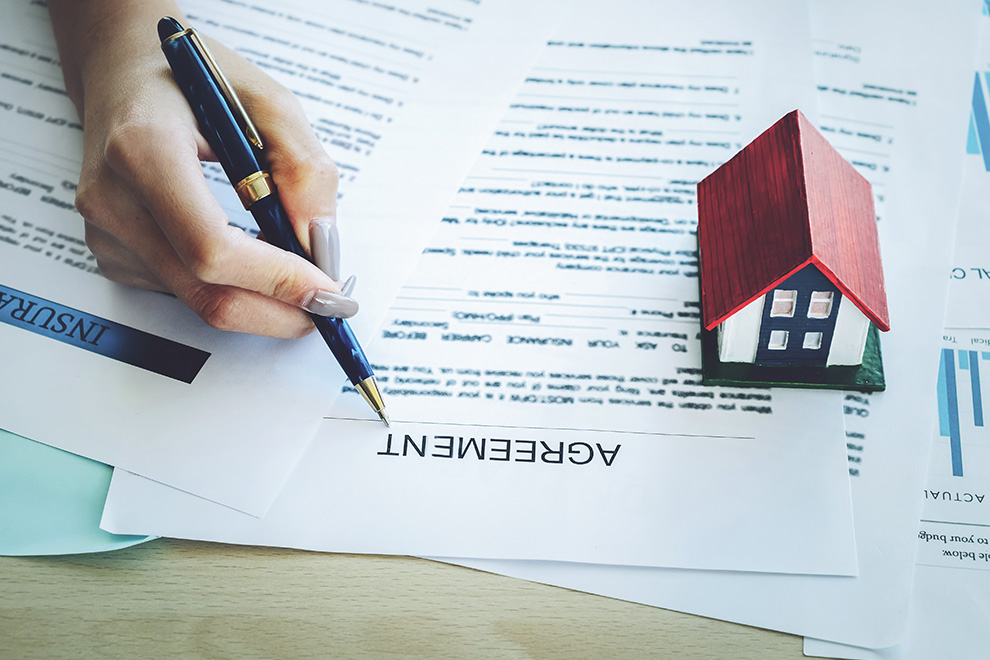Articles
How to Buy a New Home
Articles
Money matters: 7 financial to-dos when buying a house
Shopping for a home is fun. But you also have to pay for it, which means understanding the costs of buying a house and all the ins and outs of mortgage financing. Whether you are a first-time buyer or a veteran, here’s what you need to know to navigate the financial aspects of home buying.
1. The ABCs of down payment
A down payment is the money you put down when you buy a home.
How much is a down payment on a house? Canadian rules are simple.
You have to put down at least 5% on any home priced up to $500,000. For example, the minimum down payment on a $400,000 home would be $20,000.
If you buy a home priced between $500,000 and $999,999, you need to put down 5% on the first $500,000 and 10% on the rest of the purchase price. So, if you buy a home for $600,000, your total down payment is $30,000 ($20,000 plus $10,000).
If the purchase price is $1 million or more, your minimum down payment is 20% of the entire price. That means if a home costs $1.2 million, the down payment is $240,000.
One other thing: if your down payment is less than 20% of the purchase price, you’ll need to buy mortgage loan insurance. It protects the lender in the event you can’t make your payments. This default insurance is available through Canada Mortgage and Housing Corporation (CMHC), Genworth Canada, and Canada Guarantee.
2. How do you save for that down payment?
There are lots of ways you can start banking money right away. It’s surprising how fast it adds up.
- Eliminate your credit card debt and the interest charges that go with it. Put what you were paying out into the bank.
- Do you drive to work? Take public transit instead. You can save thousands a year in gas, repairs and parking.
- Slash restaurant and take-out meals. Cooking at home can actually be fun.
- How about stretching those shoes for another six months? You’d be amazed at how much you can save by buying fewer clothes and accessories.
- Take a part-time job and save the paycheque. It’s short-term pain for long-term gain.
- Now is a good time to get used to living on a post-purchase budget. The extra money you’ll need to pay for and operate your home can go into the bank for now and be used toward your down payment.
3. Arranging your home purchase financing

This is job one for any buyer. Until you know exactly how much money you can borrow, you have no idea what kind of home you can actually afford.
That means getting pre-approved for a mortgage. Many of our new home buyers get pre-approved before they even set foot inside a sales centre. That way, our Sales Representatives can help guide you to the right home.
Pre-approval also ensures you’ll know roughly what your mortgage payments will be and that your interest rate will be protected for anywhere up to 160 days as you arrange the purchase of your home. If interest rates rise during that time, you’re covered. If they decline, your rate will as well.
So how to you get pre-approved for a mortgage in Ottawa? Getting pre-approved involves meeting with a lender (often a bank or credit union) or a mortgage broker to determine the maximum you can borrow and the interest rate you’ll be charged. During the meeting, you’ll be asked questions like:
- What is your annual income?
- What are your debts and your monthly payments on them?
- Do you have other financial obligations like child or spousal support?
- What assets do you own (RRSP, investments, cash in accounts, for example)?
You may also be asked for documentation at the pre-approval stage, including personal identification and proof of earnings (pay stubs, for instance).
Mortgage pre-approval is still a crucial starting point when arranging your home purchase financing. However, mortgage pre-approval is not a guarantee you will get the loan. Talk to your lender for more information.
And don’t forget, you’ll also need to make a deposit when you buy your home, as well as scheduled interim payments before you actually take possession. Minto buyers, for example, make a minimum deposit at signing and additional interim payments.
Find out more about mortgage pre-approval.
4. Shopping for a mortgage

Consider comparison shopping as this could save you thousands of dollars over the life of a mortgage. Just think of what a great vacation all that saved money could buy.
The art of the (mortgage) deal:
- Use websites like Ratehub.ca and RateSpy.com to comparison shop for rates.
- Talk to mortgage brokers as well as your bank; a broker has more than one source of credit and can find deals your chartered bank may not offer.
- Present your bank or broker with the best rate and terms you’ve found elsewhere and ask if they will match it.
- Whether you’re dealing with a broker or a bank, ask a lot of questions — from what the penalties are if you want to renegotiate your mortgage to how often you can make extra payments — so that you’re sure you understand exactly what you are being offered. There are a lot more questions you can ask.
5. Closing costs
These costs, which must be paid at the time of purchase, are often forgotten. Knowing you’ll have to make them lets you budget accordingly.
They typically include:
The Ontario Land transfer tax: The amount depends on the cost of the home. If you’re buying a house for the first time in Ontario, you may qualify to get a rebate of up to $4000. To figure out what the land transfer tax would be on the home you’re considering and if you qualify for the rebate, check this Ontario government site.
New home warranty enrolment fee: This protects buyers from having to pay for repairs from new construction defects. The fee depends on the price of the home.
Legal fees: The cost of a lawyer when buying a house varies. Make sure to ask the lawyer what their fees are and comparison shop.
Hook-up fees: You should set aside some money because there are often fees associated with hooking up Internet, electricity, hydro and other services.
Moving costs: These depend on how far you move, how much you move, and who you hire.
Other closing costs: These could include:
- Provincial sales tax on mortgage loan insurance from CMHC or other institutions
- Registering a mortgage
- Property tax adjustments
- Bank fees
- Utility adjustments
- Insurance
- Real estate agent commission
- Appraisal fees
It is wise to save some money in preparation for any additional closing costs that may come up so that you are not caught unprepared.
6. Financial assistance for home buyers

The federal government offers financial assistance to first-time buyers and others.
First-time buyers can take advantage of the First-Time Home Buyers' tax credit, a Federal non-refundable tax credit, and the Home Buyers’ Plan, which allows you to withdraw money from your RRSP to help with your home purchase. Refer to the Government of Canada website for the most current information.
All buyers may also be eligible for the GST/HST rebate program on newly built homes. Find more information on these and other financial assistance programs.
Homes certified under specific energy programs are eligible for a partial premium refund on CMHC mortgage loan insurance.
7. Calculate your way into home ownership

Online calculators will help you map out your home buying journey.
An affordability calculator tells you how much you can afford in monthly mortgage payments or even rent payments.
Knowing your Real Life Ratio also helps determine if you can actually afford that mortgage.
A good Mortgage Payment Calculator lets you figure out monthly payments, play with various down payment and amortization scenarios and compare mortgage rates.
This Debt Service Calculator compares your monthly debt payments and housing expenses to your gross household income. To learn more about mortgage terms, visit our Glossary.
There are a lot of things to take care of when it comes to financing the purchase of your home, but going at it step-by-step and counting on the assistance of your builder and lender means you can start the process of finding a home.
